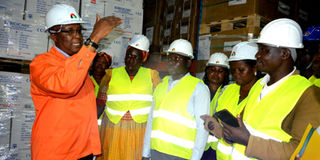NMS decries low government funding

NMS managing director Mr Moses Kamabare addressing women and youth council leaders during the tour of NMS Warehouse in Entebbe on December 10, 2018. Photo by Eve Muganga
ENTEBBE. The Managing Director National Medical Stores (NMS) Mr Moses Kamabare has revealed that the funds received from government is not enough to cater for the needs of all Ugandans.
"Last financial year they gave us Shs250 billion but when you look at the value of the medicine that went through NMS to the individual facilities was actually more than Shs900 billion. Therefore, the difference is the value of medicine and medical supplies that we get from development partners and therefore we must do well because if we don’t and our partners lose confidence in our system and once they withhold on the supplies that they give us, we will be in problems,’’ he said.
Mr Kamabare made the remarks during celebrations to mark 25 years in service held at their head office in Entebbe Municipality in Wakiso District on Monday.
They invited women and youth leaders from across the country to help them assess what they have been doing for the 25 years of existence.
“Uganda’s tax base hasn’t been able to support the rapid growth of the population and the funds got directly from the government hasn’t been enough to take care of all the needs that’s why the government has decided to run to development partners to bridge the gap which is existing between what’s needed and what the government can give and in case the tax base improves, the government should be able to take care of its own people,’’ said Mr Kamabare.
He also noted that another challenge they face is poor quantification of their needs and non-adherence to procurement plans during ordering.
According to him, NMS had some achievements like the recentralization of funds for procurement of Emergency Mental Health Services (EMHS) for facilities under the ministry of health and local governments and uniformed services like the police, army and prisons.
“Further, NMS helped in provision of oral morphine for palliation through public private partnership, supporting of children from nodding syndrome in Northern Uganda among others,” he said.
According to Ms Faridah Kibowa, the national Chairperson Women’s Council, there has been gaps and challenges at village level.
“Since we were elected at village level, we expect to work hand in hand with health workers to make sure that we tell them exactly what is on ground so that they can make it into their procurement process and forward to the Districts so that NMS can release for them the right drug that is required for their patients because there has been a challenge of these health workers asking for drugs which is not needed by the patients therefore we advise them to work with us,’’ she said.



